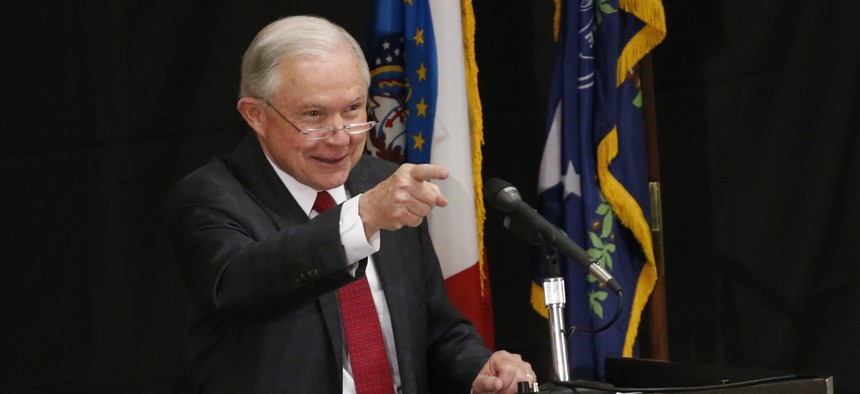DOJ Demands Information on Immigration Policies From 4 Cities Seeking Aid

Attorney General Jeff Sessions speaks at the Columbus Police Academy about the opioid epidemic, Wednesday, Aug. 2, 2017, in Columbus, Ohio. AP Photo/Jay LaPrete

Connecting state and local government leaders
The episode is the latest involving the Trump administration’s efforts to single out so-called “sanctuary cities.”
WASHINGTON — The U.S. Department of Justice is pressing four cities for information about their cooperation with federal immigration authorities before determining whether the jurisdictions will be eligible for certain federal assistance combatting violent crime.
It is the latest episode involving tensions between the Trump administration and major U.S. cities over so-called “sanctuary” policies—typically a reference to when local governments limit their cooperation with federal immigration authorities.
“These policies are driven by politics and do not protect their citizens. We will fight them with every lawful tool available,” U.S. Attorney General Jeff Sessions said in a statement on Thursday.
The four cities include Albuquerque, New Mexico; Baltimore, Maryland; and San Bernardino and Stockton in California.
"We do not enforce federal immigration laws. We do not ask people questions about their immigration status," Baltimore Police Commissioner Kevin Davis said in an emailed statement.
"We do, however, enforce the criminal laws of the State of Maryland and honor criminal arrest warrants obtained by federal law enforcement agencies," Davis added.
Albuquerque Mayor Richard Berry, in a letter to Sessions on Thursday, rejected the notion that his city is a sanctuary jurisdiction, or that it shields criminals from immigration laws. The mayor highlighted a partnership his administration forged beginning in 2009 with U.S. Immigration and Customs Enforcement, and suggested ICE let it languish.
Berry also stressed that the city's police department "does not have the resources to enforce federal immigration laws."
Officials in Albuquerque and Baltimore noted Thursday that some of the issues the Justice Department raised involve jail facilities that are not city-run, and are in fact operated by other levels of government.
Albuquerque, Baltimore and the two California cities had expressed interest in the Justice Department’s Public Safety Partnership program. Launched in June, the program provides training and technical assistance to local police.
The partnership is designed to help cities with above average levels of violent crime.
It is funded through the Edward Byrne Memorial Justice Assistance Grant Program, which Sessions announced new immigration compliance requirements for last month.
The Department of Justice sent top police officials in the four cities letters on Thursday asking for responses to three questions related to immigration enforcement.
One of the questions in the letter focuses on whether the cities have policies or practices to ensure U.S. Department of Homeland Security personnel have access to jails in order to meet with undocumented immigrants, or those suspected of being in the country illegally.
Another asks whether the jurisdictions have guidelines in place to provide at least 48 hours of notice to DHS about the scheduled release from a detention facility of an undocumented immigrant, when the federal agency requests such notice so they can arrest the person.
And the third question inquires about measures to ensure that jails and other detention facilities honor written requests from DHS to hold non-U.S. residents for up to 48 hours beyond their scheduled release, in order for DHS to take the person into custody.
Acting Assistant Attorney General Alan Hanson signed the letters, which ask for the police departments to respond by Aug. 18.
Baltimore Mayor Catherine Pugh emphasized that the state of Maryland runs the city jail in Baltimore.
She said Thursday that Sessions “does not understand who controls immigration in our city," according to The Baltimore Sun.
"As you all well know, we don’t even control the jails here," Pugh added. "That’s a state issue, so perhaps he’ll get some more information and learn how the process takes place in the state of Maryland, especially Baltimore City.”
Under Albuquerque's agreement with U.S. Immigration and Customs Enforcement, the agency's staff had space available to them at the city's prisoner transport center to screen people arrested for criminal offenses in the city, according to Berry.
The mayor said in his letter to Sessions that the arrangement worked effectively.
But, he added, local police noticed the presence of federal agents at the transport center eventually decreased and ultimately stopped. Albuquerque's police chief, the mayor pointed out, mentioned this in a letter sent in February to the Department of Homeland Security.
Berry said questions about the local jail should be directed to Bernalillo County, which operates the facility.
The Justice Department initially selected 12 cities for the Public Safety Partnership program and has said it may expand the initiative.
Davis, the Baltimore police commissioner, alluded to uncertainties about how cities were chosen for the program.
"When the original PSP jurisdictions were selected by DOJ, it was done so without a formal selection process," he said.
"We remain unaware of any formal selection process," Davis added, "but are now aware that federal immigration enforcement criteria appears to be a primary consideration."
Police officials in San Bernardino and Stockton did not immediately respond to requests for comment.
The Albuquerque mayor's office and Baltimore Police Department did not respond to follow-up questions about whether the cities would continue to seek assistance through the Public Safety Partnership program.
This story has been updated to include comments from officials in Albuquerque and Baltimore.
Bill Lucia is a Senior Reporter for Government Executive’s Route Fifty and is based in Washington, D.C.

NEXT STORY: For Rural Veterans, New Approaches to Health Care





